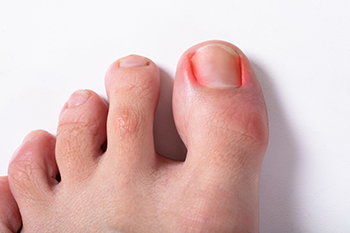 Ingrown toenails, a common condition where the nail grows into the skin surrounding the toe, have a variety of risk factors. Trimming the toenails too short or rounding the edges of the nail can encourage the nail to grow into the skin rather than over it, so proper nail trimming is important. Wearing tight footwear and socks that squeeze the toes can also contribute to the problem by pushing the nail into the toe skin. Athletes and individuals who engage in activities that put repeated pressure on the toes are at an increased risk, as this pressure can cause the nail to grow incorrectly. While genetics do not usually play a major role in causing ingrown toenails, some people are predisposed to developing them because they are born with naturally curved or thick toenails. Also, poor foot hygiene and injury to the toenail area can increase the likelihood of developing an ingrown toenail. If you are suffering from an ingrown toenail, or wish to know how to prevent ingrown toenails from occurring in the future, it is suggested that you consult a podiatrist.
Ingrown toenails, a common condition where the nail grows into the skin surrounding the toe, have a variety of risk factors. Trimming the toenails too short or rounding the edges of the nail can encourage the nail to grow into the skin rather than over it, so proper nail trimming is important. Wearing tight footwear and socks that squeeze the toes can also contribute to the problem by pushing the nail into the toe skin. Athletes and individuals who engage in activities that put repeated pressure on the toes are at an increased risk, as this pressure can cause the nail to grow incorrectly. While genetics do not usually play a major role in causing ingrown toenails, some people are predisposed to developing them because they are born with naturally curved or thick toenails. Also, poor foot hygiene and injury to the toenail area can increase the likelihood of developing an ingrown toenail. If you are suffering from an ingrown toenail, or wish to know how to prevent ingrown toenails from occurring in the future, it is suggested that you consult a podiatrist.
Ingrown toenails may initially present themselves as a minor discomfort, but they may progress into an infection in the skin without proper treatment. For more information about ingrown toenails, contact Ramin Nadjafi, DPM of Advanced Podiatry Group. Our doctor can provide the care you need to keep you pain-free and on your feet.
Ingrown Toenails
Ingrown toenails are caused when the corner or side of a toenail grows into the soft flesh surrounding it. They often result in redness, swelling, pain, and in some cases, infection. This condition typically affects the big toe and may recur if it is not treated properly.
Causes
- Improper toenail trimming
- Genetics
- Improper shoe fitting
- Injury from pedicures or nail picking
- Abnormal gait
- Poor hygiene
You are more likely to develop an ingrown toenail if you are obese, have diabetes, arthritis, or have any fungal infection in your nails. Additionally, people who have foot or toe deformities are at a higher risk of developing an ingrown toenail.
Symptoms
Some symptoms of ingrown toenails are redness, swelling, and pain. In rare cases, there may be a yellowish drainage coming from the nail.
Treatment
Ignoring an ingrown toenail can have serious complications. Infections of the nail border can progress to a deeper soft-tissue infection, which can then turn into a bone infection. You should always speak with your podiatrist if you suspect you have an ingrown toenail, especially if you have diabetes or poor circulation.
If you have any questions, please feel free to contact our office located in Orlando, FL . We offer the newest diagnostic and treatment technologies for all your foot care needs.
